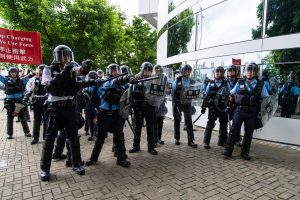When Hong Kong was handed over from Britain to China with great fanfare on July 1, 1997, there was a cloud hanging over the process. The shadow of the 1989 Tiananmen Massacre loomed large, casting doubt on whether the promises that Beijing had made in international law could be trusted.
23 years later, Beijing’s decision to bulldoze through national security legislation without consulting the Hong Kong government vindicates those skeptical about the viability of the handover settlement. The Chinese Communist Party considers the illusion of Hong Kong’s high degree of autonomy to be so irrelevant that even the city’s puppet leader, Carrie Lam, did not see a draft of the law until it had been ratified.
Global outrage has erupted. More than 900 parliamentarians from over 40 countries have co-signed a criticism of the decision, condemning it as a “flagrant breach” of the handover agreement. This is a rare bipartisan issue everywhere from Washington to Tokyo, from London to Canberra.
Foreign ministries are now asking what can be done that is a proportionate response. Coordinated sanctions are an obvious first step, but political differences between Brussels and Washington, combined with the alarming dependency of so many states on China, means that this is unlikely.
In the long run, there is a growing awareness that the geopolitical map is moving, and that much of the West has been caught napping. Diplomats are starting to consider how to reduce strategic dependency and strengthen free world countries and multilateral institutions. The new International Parliamentary Alliance on China, China Research Group in the United Kingdom, and China Task Force in the United States have all been established with this aim.
But in the immediate term, there is one obvious course of action. Hong Kong has long been the bridge between East and West, but it is fast becoming a key faultline. The new national security legislation will leave thousands of young, liberally minded people in Hong Kong vulnerable to prosecution under the same charges that confined the Nobel Peace prize winner Liu Xiabo to more than a decade in prison, right up until his death.
An international lifeboat policy is urgently needed, with countries working together to ensure that there is a way out for Hong Kongers. This is not meant as a white flag of surrender, but rather gives each citizen the opportunity to stand for freedom in their home city in the knowledge that there is a way out if they absolutely need it.
The British government has already taken bold steps to this effect. Prime Minister Boris Johnson has committed to offering a pathway to citizenship for up to 3 million Hong Kongers who hold British National (Overseas) passports, if the bill to that effect passes.
It is right that London is taking the lead on this, as the 1997 handover agreement increasingly looks like a historic failure in British foreign policy, peacefully ceding Hong Kong to an authoritarian state. But the British government must not stand alone. No one born since 1997 holds a BNO passport. The irony is that this act of British magnanimity helps everyone except the youthful protesters who have captured the world’s imagination.
As geopolitical tensions between China and the West ratchet up, there is a genuine risk that these brave young people will be the collateral damage in the cycle of nationalist polarization. The banging drum of demagoguery may see Hong Kong’s bright and enterprising people caught in the middle. We must not let that happen.
This is why international coordinated action is sensible. Nations should club together to ensure that there is a lifeline for everyone who needs it. Senators and representatives in the United States have made the call, as have Australian and Canadian parliamentarians. The Taiwanese and Japanese governments are both taking tangible steps. If each of these governments takes steps to legislate for Hong Kong refugees, everyone will have the lifeline that is needed.
Too often through history, refugee policies come after repressive measures are implemented. But the world can see that this national security law will have profound implications and should take the precautionary steps to ensure that an international lifeboat is offered before it is too late.
Benedict Rogers is co-founder and Chair of Hong Kong Watch. Johnny Patterson is Director of Hong Kong Watch.

































